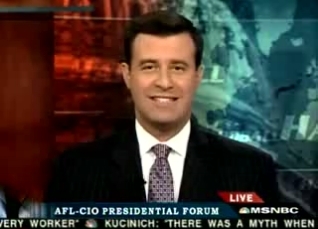
First off, Chris Dodd had criticized Barack Obama during the debate for saying he would go into Pakistan "unilaterally" to attack top Al Qaeda leaders, to which Obama responded he would not go into Pakistan unilaterally without first "work[ing] with" Pakistani President Musharraf to see if Musharraf would take action. Everyone was speaking the truth... Until Shuster weighed in to declare Obama's statement flatly "incorrect," citing as smoking-gun proof the recent speech where Obama said: "If we have actionable intelligence about high-value terrorist targets, and President Musharraf will not act, we will." Um...gotcha? Which part of that statement says (or even suggests) that as President Obama would not communicate or negotiate with Musharraf prior to taking unilateral action? Beats me.
But Shuster was already on to his next target, John Edwards, who said during the debate that he had walked over 200 union picket lines and had been on one this Saturday. Shuster reveals that Edwards reportedly visited the picket line Saturday for only ten minutes, and even got some campaign ad footage while he was there. To Shuster's credit, he stated the facts clearly and refrained from using any libelous terms like "incorrect" against Edwards - he just strongly implied with his tone of voice and incredulously raised eyebrows that Edwards should be ashamed for trying to put one over on us. Should he? I'm glad to have the facts, but the way Shuster pre-judged them as reflecting badly on Edwards is certainly debatable.
Biden and Clinton also got the Shuster treatment - he called them both "untruthful." In grasping for words strong enough to describe the harm President Bush has done to the country, Biden spoke during the debate of "how much [Bush] has ruined" it. Exactly no one was confused by what Biden said, but, short of material, Shuster pounced anyway. Citing the dictionary definition of "ruin" as causing "irreparable damage," Shuster declared Biden's usage "pretty amazing" and "a bit of a stretch." For starters, it is not quite so clear whether the harm Bush has done, say, to the ozone layer, or the lives of the residents of New Orleans, is irreparable or not. But that aside, does walking us through the definition of "ruin" really shed light on anything?
Speaking of New Orleans, Hillary made the supposedly grave error of saying that as President she would "put somebody in charge who actually cared about the people of New Orleans," clearly implying that Bush's people hadn't. Again, her statement confused no one anywhere about the facts. Yet Shuster rung her up for untruthfully characterizing the Bush administration's sentiments. I dunno, is it really so crazy to say that Brownie and his gang did not care about New Orleans residents enough to prepare and protect them, even when they were being paid to do just that? As far as I know, the facts more than bear that assessment out (how long ago did Bush himself vow to rebuild the place)? But Shuster concluded "To say that the Bush administration doesn't care about New Orleans - that's a leap."
In case the words "incorrect," "untruthful," and "misleading" didn't make his point clear, Shuster's scolding tone and slightly knitted brow underscored his disapproval. After each of the four video clips he played, he literally made a "tsk" sound as he resumed speaking.
Again, to Shuster's credit, he did present all of his source material very clearly, so even as he was pretending to make a damning case, he was arming careful viewers to reach their own conclusions. This is in stark contrast to Dr. Sanjay Gupta's recent piece on Michael Moore's movie Sicko, where unraveling Gupta's inaccuracies took some digging.
But is that really the best we can hope for from our journalists? Would it be so terrible to acknowledge when candidates do a decent job of sticking to the facts? Or should we just tear them all down equally - in the name of journalistic objectivity, presumably - regardless of who's actually fibbing and who's not?
Having live-blogged this debate myself (and been painfully aware that for the most part, not a whole lot new happens), I am not unsympathetic to the need to say something to fill airtime. But as important as it always is to get the facts right in reporting about the great issues of the day, it is especially important to get the facts right when leveling accusations of untrustworthiness at presidential candidates. As both Al Gore and John Kerry demonstrated, a reputation for being misleading and contradicting oneself is very hard for a candidate to overcome. We are trying to pick a new leader of the free world here. It's kinda important that we get this right.